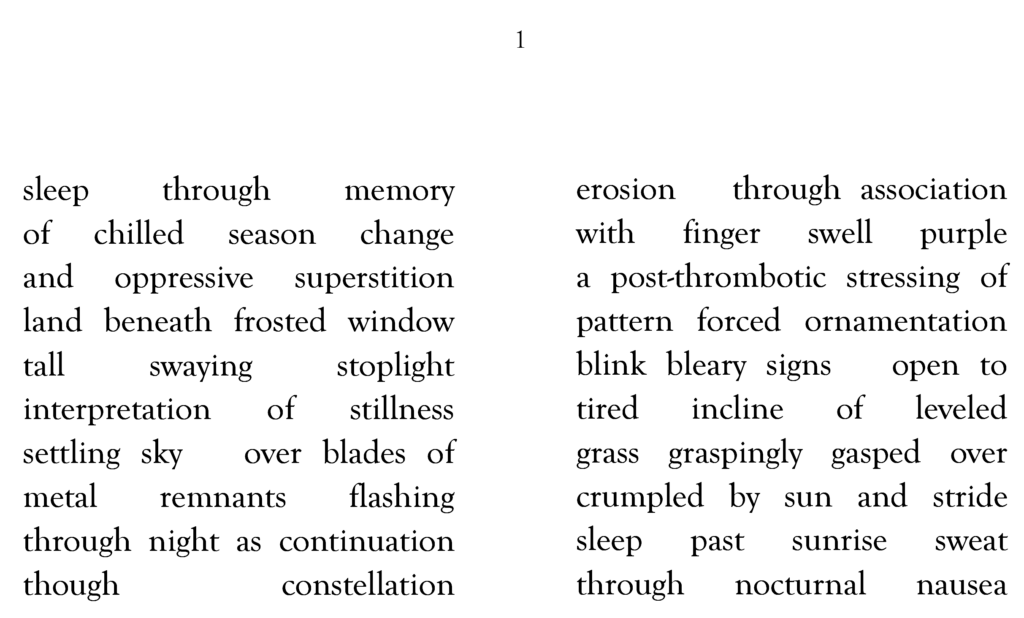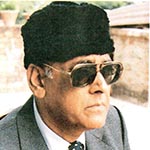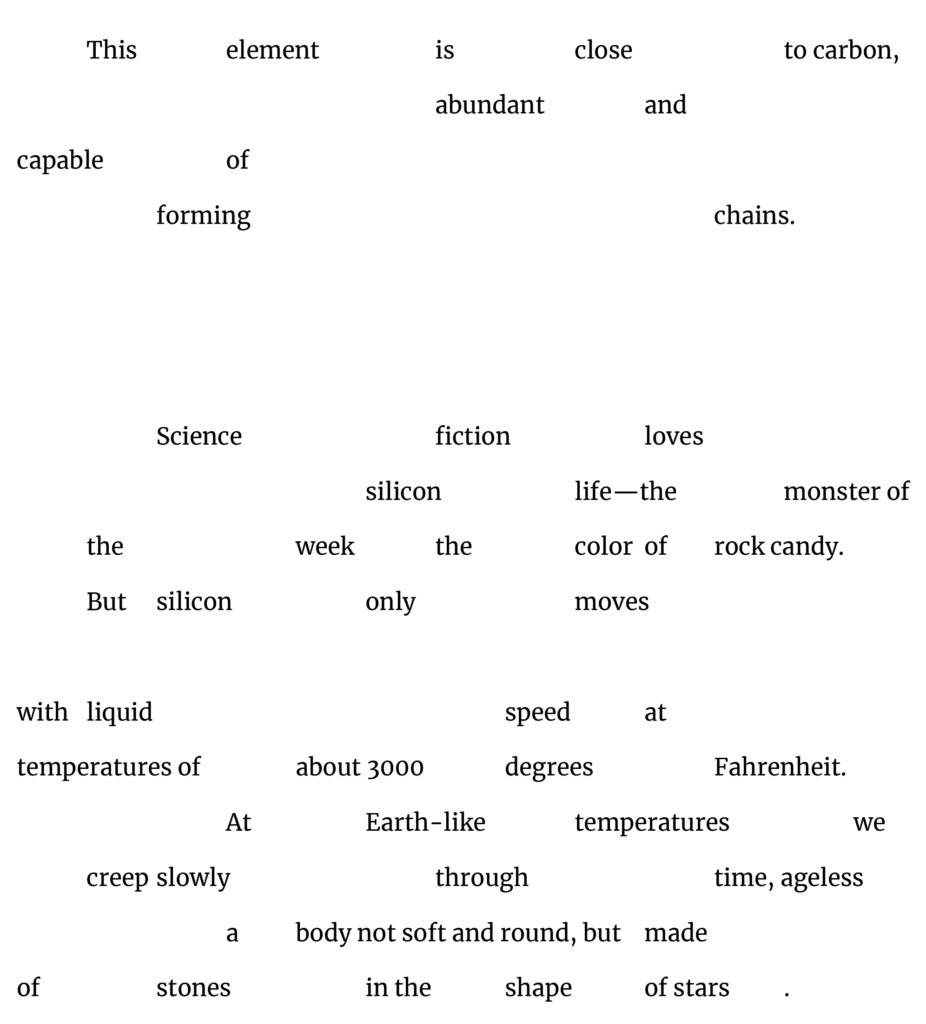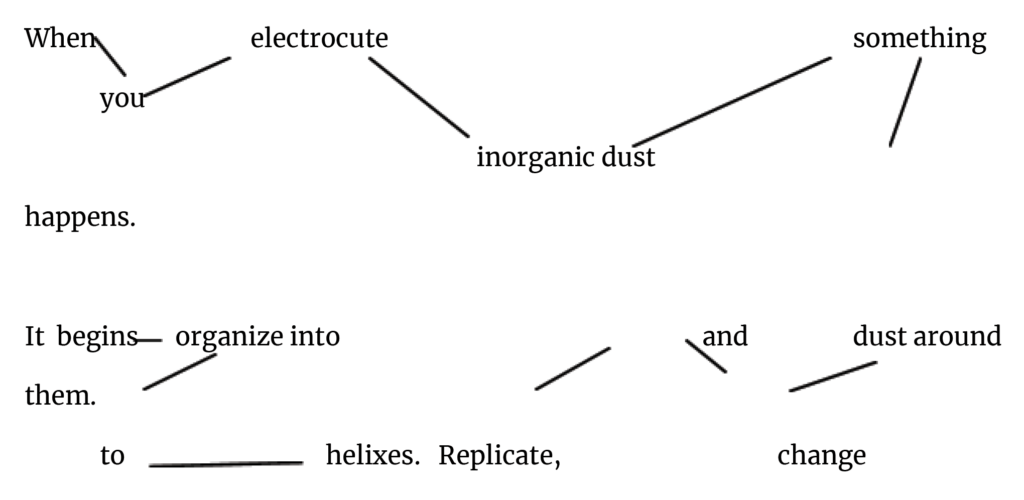Funny Story
Would people be haunted by guilt or regret? Would they be frightened? Supposedly we all are. After a long illness, at home, in their own bed, they might be resigned, ready to pass on to their Heavenly Reward, if that’s where they were going. Some hung on from one season to the next, though that was rare, according to experienced caseworkers. Most were weary, with no expectation of regaining their health; they seldom lasted more than a month.
Danielle didn’t know how to refer to her work when she first started. The trainers were so careful about how they phrased things and that made her self-conscious. On the bus between jobs she imagined how she would answer if asked: What do you do for a living? A living—she’d never thought about the use of that word. She could say, “I’m in End of Life,” the way one of her uncles used to say, “I’m in Life Insurance.”
Transition—that was the word they used. A word so ordinary it hardly seemed appropriate. Family members sometimes found it confusing. Clearly this was The End, not a different level of assisted living or the next stage of rehab. But “transition” it was, as if the patient would continue on in some other form or dimension. At intake, they asked about the religious or spiritual orientation, but a person could be undecided or change their mind. The manual stressed sensitivity and being able to adjust to changing situations while remaining calm and compassionate. As Mrs. Gurnsey, their instructor, said, “Be of good cheer—but not cheery.”
Everybody was so serious, especially the young, New Age-y types. Danielle had to watch herself. Humor could be misunderstood; she didn’t want to seem disrespectful. She had only to recall the swift slap across the face that was her own mother’s response to one of her wisecracks. You couldn’t always tell how people were going to react.
Before taking the job, she hadn’t really known anyone who had died, except for her grandmother. Last year she went to the wake of a cousin who was too young to have suffered a heart attack, but that’s what they said had killed him. They weren’t close, but still, it was a jolt to see him laid out like that at the funeral parlor. In grade school, her whole class went to the funeral of a beloved teacher who died in a snowboarding accident. Danielle had never been right there when someone died.
Gathered around the coffee urn during a break in the training, Hannah, a seasoned RN, told them about a patient she had been seeing up until last week. “She had woken up before, when she’d wanted more morphine and it would have been time for another dose, but she didn’t seem to hear or be aware of me. Her eyes were focused on another spot in the room. She seemed to be watching something I couldn’t see. I noticed her hands, the pale tips of her fingers. Her face relaxed and the breath stopped. It was very peaceful.”
The other hospice workers all seemed to be religious. The manual was full of Bible quotes. As a lapsed Catholic, Danielle had no particular beliefs. Death, like life, was a big question mark.
Her friend Connie asked if it was difficult. Compared to standing on an assembly line as she had just out of high school? No, it was easier than that. Easier than waitressing. Easier than working in a shop where the boss would pressure you to go out for a drink at closing time and then try to feel you up. The dying people were easy. Other hospice workers warned that the family members were sometimes difficult, but they usually came to you afterwards and apologized.
In the morning, Danielle woke up tired and bleary. The toast burnt, the blouse she was going to wear had a spot she hadn’t noticed. Another she wanted to wear had to be ironed and she nearly missed the bus. She sat staring out the window and then reminded herself to have another look at the file. Her first visit was a new patient. She had asked the bus driver when she got on about the street and he yelled out the name when he saw she hadn’t gotten up. “It’s one block back,” he said, when
she ran up the aisle.
There were massive homes, many she could only catch glimpses of through gaps in thick hedges or at the gates of high fences. The branches of large elms and oaks would soon grace the street with shade. Behind a stone wall a walkway led up to a stone house, easily a hundred years old. Above the bell a bronze plaque displayed the family name.
The door opened. “Oh, good, you’re here,” said the lady in a white blouse, an RN badge clipped to her collar. “I’m on my way out. The daughter is supposed to be here. She called from New Hampshire and said she’s on her way.”
Danielle followed her into the carpeted hallway. “Mrs. Ryan’s in here,” said the nurse, pointing at the doorway. “I think she just woke up. There’s no change. Signs all good. Her daughter should be here sometime this morning. Gotta run.”
The front door closed and Danielle felt the stillness of the house around her. She went down the hallway, past a series of small paintings of sailing ships, all dark and old, like those in a museum. She looked at one and saw men in rowboats alongside a whale.
There was no one to explain who she was to the dying woman lying in the bed under a velvety brown coverlet. Danielle stood in the doorway, thinking it would be good to say hello before she walked into the room. She prepared herself for the sickroom smell that was as distinct as a forest or a bakery, but there was only a whiff of lavender. On the far wall were French doors that opened onto a patio, the sheer curtains letting in a good amount of light. Though it was on the first floor, it didn’t seem to be a makeshift space, one recently configured to accommodate a feeble person who could no longer climb the stairs. The heavy maple bureau and queen-sized bed with doweled posts all seemed to have been here for a while. At another patient’s, they had converted the dining room into the sickroom and the whole house had seemed thrown out of kilter with people having to skirt around to get to the kitchen.
“Hello Mrs. Ryan, I’m Danielle.”
Close enough to see the woman’s face, it was the same grayish-white as the whale in the painting she’d just seen, the features prominent, a high forehead and gray hair against a white pillowcase.
Danielle stood still, waiting for the woman to register her presence. There had been no mention of a stroke in the file. Without moving her head or showing any sign of acknowledgement, the woman’s eyes focused on her.
“I’m here from the Passages Agency.” Danielle took another few steps. “Is it all right if I sit down?”
The intensity of the stare diminished. Danielle took that as a yes and slipped off her jacket. “It’s not raining, like they said it would. We could use the rain. The crocuses are just coming up, and the daffodils.” The woman’s eyes stayed glued to her face, not stern but not exactly friendly either. Curious. “Pretty soon the trees will be all leafy again.”
She stopped, wondering if it was wrong to be going on about spring, with all it signified, to a person who might not be here to see the blossoms.
“You have a very nice house.” The face relaxed and seemed somewhat pleased. “Is there anything you need? Anything I can do for you?”
The woman’s head tilted slightly one way and then the other.
“Would you like me to read you a story?”
The woman blinked in a way Danielle understood to mean yes.
She carried two slim volumes with her: the pocket bedside companion the agency provided and a collection of stories she’d picked up at the library. The French doors made her think of the story about a precocious girl who tells a tale to a nervous visitor about the men who went out hunting never to return. Maybe that wasn’t appropriate since it involved fright at what are thought to be ghosts.
“Let’s see…” She ran her finger down the Table of Contents. “The Yellow Wallpaper.” Definitely not. Nor Edgar Allan Poe or the one by James Joyce. Not the Jack London either. Why weren’t there any funny stories in this book? Better to stick to what the agency had given her. At random, she opened the book and found a story about a boy and his grandmother on the day of her birthday.
She heard the sound of the front door, then a voice from down the hall. A thin young woman stood in the doorway, large eyes peeking out beneath schoolgirl bangs. The flowery dress and the purse dangling in the crook of her arm suggested a child playing dress up. A high, tiny voice furthered this impression. “Oh, hello,” she said.
For a second, Danielle felt she should stand but stayed seated and introduced herself.
“My mother said you were coming,” the girl said. “Sorry I’m late. So the nurse was still here?”
“Yes, she let me in.”
“I’m Celia,” said the girl. Her body had not an ounce of fat, her jaw bone prominent in her face.
“I thought I might read her a story.”
“Oh, yes. She likes that. Hi, grandma.” She went up to the bed, stopping just short.
Mrs. Ryan acknowledged the granddaughter with a nod.
“Don’t let me interrupt,” said the girl. “I’ll go make some tea.”
Halfway through the story Mrs. Ryan dropped off to sleep. Danielle kept reading for another page until she was sure. The granddaughter did not come back into the room for what seemed like a long time. Danielle needed to use the bathroom. This was the worst part of being in a strange house, the things people didn’t think to tell you.
She turned down the hall toward the bright room at the end where there were cabinets and a counter. On her left was a white tiled floor and a black-and-white striped shower curtain. The door had a cut-glass doorknob. She closed it and turned the bolt. In another house she’d been walked in on. The silver handles and faucet were shiny, every surface spotlessly clean. Her pale blue blouse neatly tucked into her gray wool slacks, her reflection in the mirror looked back at her with a quiet forbearance. She used one of the monogrammed guest towels and folded it back into place, listening to the sound of a female voice. It was the girl down the hall in the kitchen talking on her phone. Danielle cracked the door open.
“No. I can’t. I told you. I’m in Brookline… I had to go. It’s my grandmother. She’s dying. Or at least she’s supposed to be… Fuck, I don’t know.”
Danielle put her hand over her mouth to stifle her surprise. But that was nothing to what followed. Just as shocking was the incongruity of a girl with the sensuality of a stick figure talking “smutty talk,” as her mother used to say.
“Slowly, very slowly, I’ll take you inside me…”
Danielle wished for her to do it quickly. Soon she would have to catch the bus and she couldn’t just leave without saying goodbye to the granddaughter who was now mimicking—at least Danielle hoped she was mimicking—sounds of arousal. Danielle waited some more, but it was like quicksand; it got worse. Would it be better to interrupt before the climax or wait until after? If she waited until after, it might be obvious that she’d been listening.
The carpet muffled her footsteps. She had the idea to go back to the other end of the hall and from there start down again, calling out the girl’s name. It would have helped if the girl’s name hadn’t slipped her mind. She felt silly calling out, “Hello,” but she had to give warning before she walked in on her.
The girl said, “Sorry, I have to go.”
That was just what Danielle was about to say and she fumbled to come up with something else, so as not to parrot the girl.
“I…ah…it’s time for me … I have another patient.”
Celia—that was her name!—wore the willfully blank expression of a guilty teenager. She held her phone pressed between her hands. Praying hands. A popular image on the pages of inspirational books. Danielle smiled and said, “She’s sleeping now.”
Some of the trees were sycamores—that was the name of the street. On a brick wall by a gate, the house number was written out in wrought iron script. The gate had a tricky mechanism to open. The rose bushes were all thorns along the walk to the imposing dark-varnished door of the two-story Victorian. She could only guess at how many rooms it held. Her finger pushed in the round black button setting off a metallic gong.
An older woman with an efficient manner opened the door and nodded at her, one employee to another. “Hello Danielle,” said Mrs. Samkin.
In the long, dark wood-paneled hall, Danielle asked how Mr. Bartley was doing today. Mrs. Samkin stopped outside the door of the sickroom. “When I last checked, he seemed to be resting.”
Danielle knew nothing about Mr. Bartley’s life, other than he himself had been very successful or had inherited wealth. On previous visits, she read a few items from the newspaper and they’d discussed the weather, a more substantive subject than it used to be, he said. No family members were on hand to shed any light on his interests.
The sick smell was heavy in the room. Immediately Danielle noticed his color. He didn’t appear to be breathing. The housekeeper stopped in the doorway.
“Oh,” she said, coming into the room.
“Yes,” said Danielle.
“Are you sure?”
Danielle clenched her lips and took hold of the man’s wrist. “There’s no pulse.”
Mrs. Samkin approached, her hands pressed to her stomach. She inspected him closely and stepped back. “I have worked for him for twenty-one years,” she said.
“Does he have other family, besides the daughter who contacted the agency?”
“Yes. I’ll have to call them.”
What would she do, now that her years of service had ended? But Mrs. Samkin had already left the room and Danielle was alone with the dead man. She sat down and took out the manual to run through the checklist.
She took out her phone to call the office. This was her first deceased and she was disappointed. If she had been present at the moment of his passing, perhaps she would have witnessed something profound. She made her report and filled out the form.
She scanned the room: the blue tile around the fireplace, the crystal and ceramic items on the mantel. She was fascinated by the kindling in the grate and the split logs in the brass bucket, the long handled implements. What were they called? Irons or something? In the training, they were told not to show any interest in decorative objects. Things tended to disappear from homes of the dying and you didn’t want to give cause for suspicion. Danielle had never lived in a house with a fireplace. They conjured up Bronte novels, as did the antique furniture with its carved wood scrolls. Was that a settee or a divan?
She pulled out her bus schedule. Last week she caught the 2:38 and was late for her three o’clock appointment. Where had Mrs. Samkin gone? Danielle needed to ask her about the funeral home.
No sounds inside. No sounds from the street. She moved down the hall and a floorboard creaked under the thick carpeting. Where she lived, there were neighbors on either side of the wall, the noise of people and cars passing. She wasn’t used to this silence. She stood at the foot of the wide staircase that rose and divided on either side of a carved wood panel.
“Mrs. Samkin?”
A housekeeper would have a room on the first floor, she guessed, off the kitchen. Yet where Danielle stood, one hand on the curved banister, she heard a faint sound coming from upstairs. The manual was very clear about keeping to the part of the house where they saw the patient. Danielle called out again and waited.
It was like stepping back in time, some of these houses. Danielle envisioned a black rotary phone on a little stand in a room upstairs. On the landing, she stopped and questioned if the voice she heard was that of the housekeeper. There was no one else in the house, as far as she knew. Danielle hadn’t seen anyone and Mrs. Samkin never mentioned anyone else living there.
She went the rest of the way up the stairs. An old woman’s voice, firm and throaty, drew her down the hall to a doorway where she could see an expanse of Oriental rug and a pair of armchairs. The voice said, “I don’t expect so. Not really.”
Danielle looked up and down the hall, anxiously, before she stepped into the room. Seated in front of another tiled fireplace with a large gilded mirror over the mantle was a small, white-haired woman.
“That will be fine. Yes, all right, then.”
Danielle walked across the carpet. The woman saw her and showed no surprise. “Miss Doucette, you’ve come to say goodbye.” She was very old; her skin nearly translucent.
“I…” Danielle had to start again. “I was about to leave…there was no one around.”
“Yes, Ann has things to attend to. I was just speaking with her.”
On the table next to the woman’s chair, Danielle saw some sort of intercom and the back of a screen—the kind hooked up to a security camera.
“He, Mr. Bartley, he went…” she was about to say “very peacefully,” but she wasn’t there, so she didn’t know.
“Yes,” said the woman, not waiting for her to finish. “Thank you. Thank you very much for your service.”
Danielle took a step back. “Uh, I had a question about the funeral home. Is it the one in Newton?”
“Ann can answer that for you.”
“That’s right,” said a voice behind her. Danielle nearly jumped and turned to see Mrs. Samkin.
“Ah, well, goodbye Mrs….”
“Yes, goodbye,” said the woman, folding her hands in her lap.
On the stairs, she expected Mrs. Samkin might explain about the lady she’d just met, but they descended, with only the sound of her breathing and the rustle of her dress. The woman upstairs hadn’t been sitting in a wheelchair, but perhaps she wasn’t able to get around and that’s why Danielle hadn’t seen her before.
Mrs. Samkin told her the name of the funeral home. She opened the door and Danielle went out into the cool, fresh air. She walked down the long path to the gate, stepped out to the curb and started to cross.
Something made her turn and look back at the house with its mansard roof and weathervane. A figure stood at one of the windows on the second floor.
The screech of brakes brought Danielle back to the street and the car that had stopped just a foot or two away from her. The woman behind the wheel stuck her head out the window.
“My God, watch where you’re going.”
Danielle was overcome by the tingling sensation coursing through her.
“It’s not funny,” said the woman. “You could get killed like that!”
Danielle apologized, haltingly, and moved onto the curb on the other side.
She went around the corner and had to lean against the mailbox, she was laughing so hard.
Monica Hileman grew up in the Midwest, lived in the Pacific Northwest and settled in New England. Two years in Greensboro, North Carolina yielded an MFA from UNC-G. Her stories have appeared in publications such as The Baffler, the Chicago Tribune’s Printers Row Journal, Arts & Letters, Catamaran Literary Reader, and Flyway (nominated for The Best of the Net).
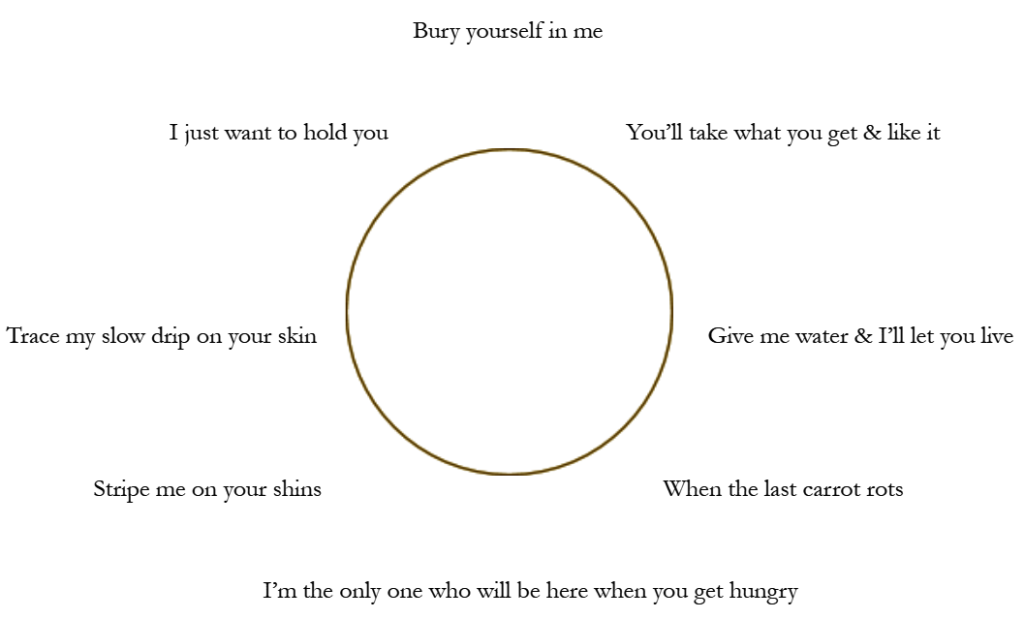


 BACK TO ISSUE
BACK TO ISSUE